人教版(2019)选择性必修第一册Unit 2 Looking into the Future Listening and Speaking 课件-(19张)
文档属性
| 名称 | 人教版(2019)选择性必修第一册Unit 2 Looking into the Future Listening and Speaking 课件-(19张) | 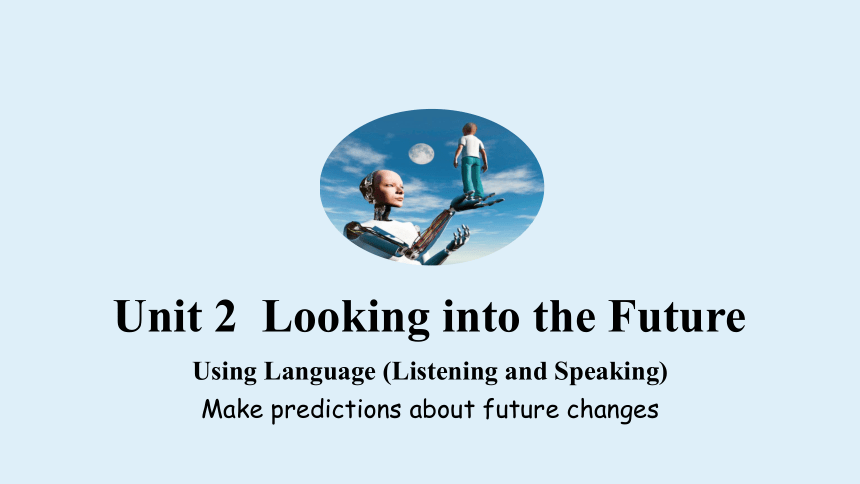 | |
| 格式 | zip | ||
| 文件大小 | 35.9MB | ||
| 资源类型 | 教案 | ||
| 版本资源 | 人教版(2019) | ||
| 科目 | 英语 | ||
| 更新时间 | 2022-10-21 08:19:48 | ||
图片预览

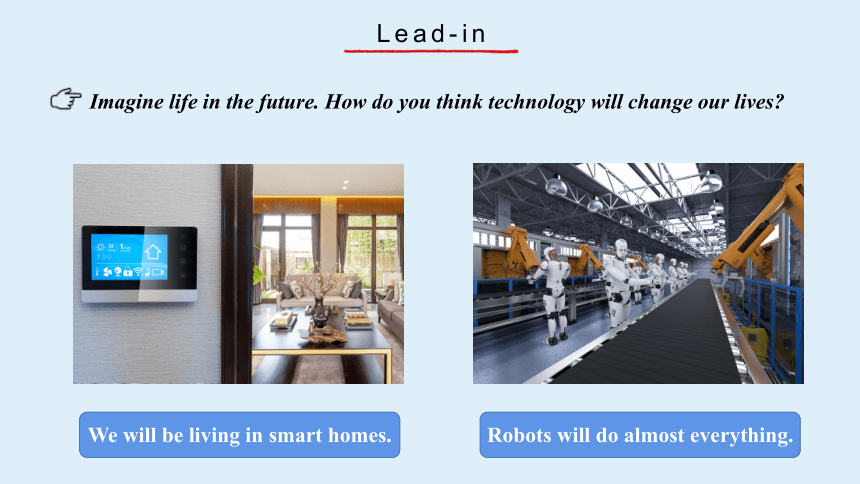

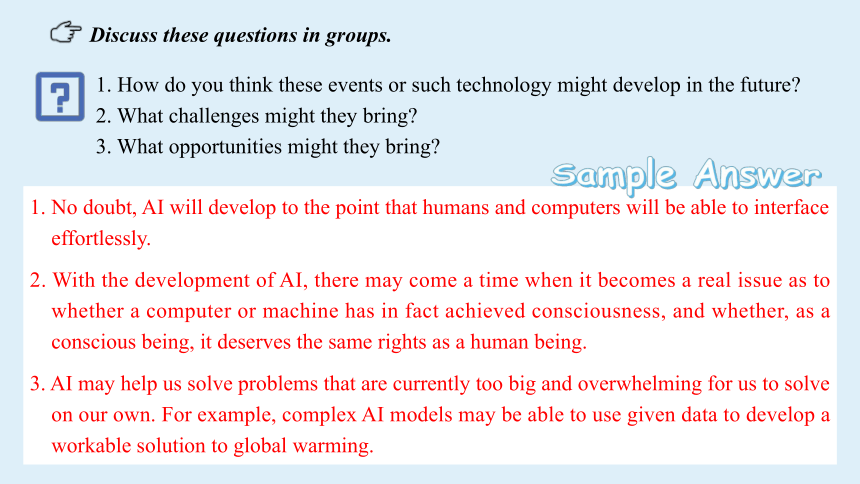
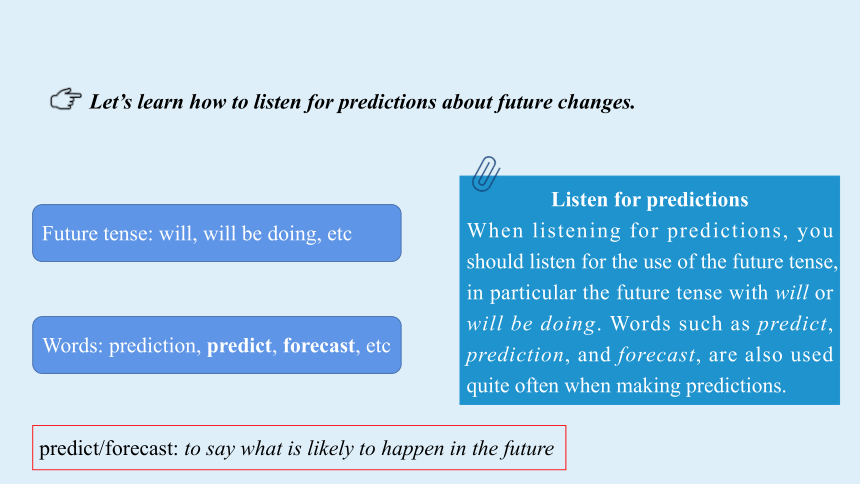
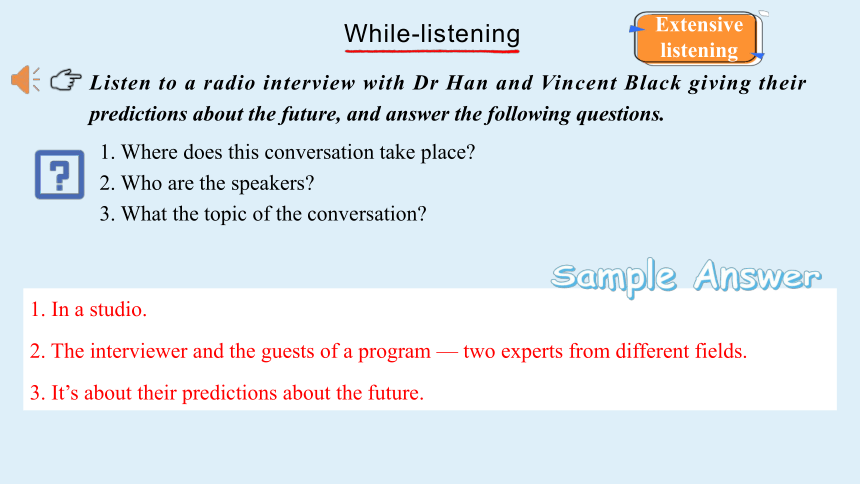
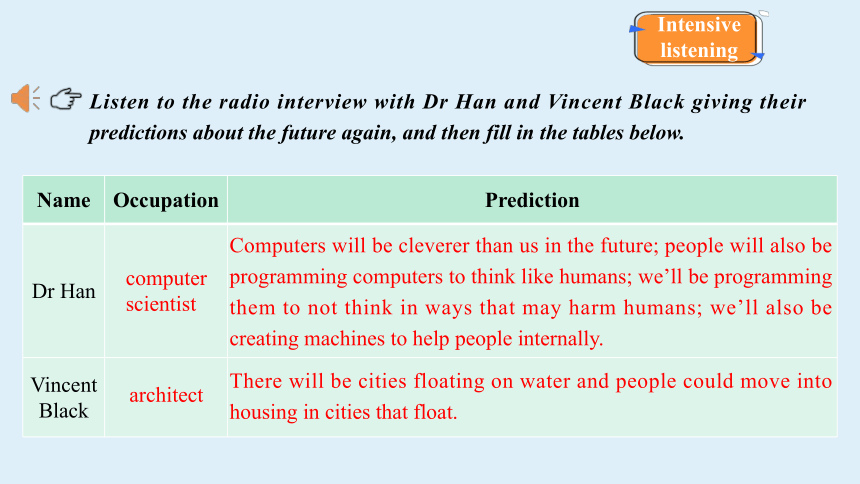
文档简介
(共19张PPT)
Unit 2 Looking into the Future
Using Language (Listening and Speaking)
Make predictions about future changes
Imagine life in the future. How do you think technology will change our lives
Lead-in
We will be living in smart homes.
Robots will do almost everything.
What do these pictures show Match the words with the pictures.
Pre-listening
_________ automation
_________ nanobots (纳米机器人)
_________ global warming
_________ artificial intelligence (AI)
_________ cloning
①
②
③
④
⑤
①
②
③
④
⑤
Discuss these questions in groups.
1. How do you think these events or such technology might develop in the future
2. What challenges might they bring
3. What opportunities might they bring
1. No doubt, AI will develop to the point that humans and computers will be able to interface
effortlessly.
2. With the development of AI, there may come a time when it becomes a real issue as to
whether a computer or machine has in fact achieved consciousness, and whether, as a
conscious being, it deserves the same rights as a human being.
3. AI may help us solve problems that are currently too big and overwhelming for us to solve
on our own. For example, complex AI models may be able to use given data to develop a
workable solution to global warming.
Sample Answer
Let’s learn how to listen for predictions about future changes.
Listen for predictions
When listening for predictions, you should listen for the use of the future tense, in particular the future tense with will or will be doing. Words such as predict, prediction, and forecast, are also used quite often when making predictions.
Future tense: will, will be doing, etc
Words: prediction, predict, forecast, etc
predict/forecast: to say what is likely to happen in the future
While-listening
Listen to a radio interview with Dr Han and Vincent Black giving their predictions about the future, and answer the following questions.
1. Where does this conversation take place
2. Who are the speakers
3. What the topic of the conversation
1. In a studio.
2. The interviewer and the guests of a program — two experts from different fields.
3. It’s about their predictions about the future.
Sample Answer
Extensive listening
Listen to the radio interview with Dr Han and Vincent Black giving their predictions about the future again, and then fill in the tables below.
Name Occupation Prediction
Dr Han
Vincent Black
computer
scientist
architect
Computers will be cleverer than us in the future; people will also be
programming computers to think like humans; we’ll be programming
them to not think in ways that may harm humans; we’ll also be
creating machines to help people internally.
There will be cities floating on water and people could move into
housing in cities that float.
Intensive listening
Future events/problems Future technologies /Solutions Influences on our lives
Dr Han’s prediction
Vincent Black’s prediction
Computers would be clever than humans.
The sea level will rise by many metres.
Nanobots will be put inside our bodies.
Cities floating on water will be built.
Our abilities will be increased.
People don’t need to move away from the sea.
Listen to the radio interview with Dr Han and Vincent Black giving their predictions about the future again, and then fill in the tables below.
Host: On today’s episode of “Future Changes”, we talk with two experts from different _____, Dr Han and Vincent
Black, to hear their predictions about the future. First, Dr Han, could you please tell our audience what you do
Dr Han: __________. I’m a computer __________.
Host: And could you please tell us your prediction
Dr Han: Yes, well, I _________ that computers will be cleverer than us in the future. I think that people will also be
___________ computers to think like humans.
Host: That’s very interesting, but aren’t you worried that such computers would be dangerous
Dr Han: Not at all. This is because we’ll be programming them to not think in ways that may harm humans. In fact,
we’ll also be creating _________ to help people internally. For example, I think scientists will put some small
__________ machines, called nanobots, inside our bodies to increase our abilities.
Host: Wow! That would make each one of us superhuman! And Vincent, could you please tell us about your job
Vincent Black: Certainly. I’m an architect. I ________ buildings.
Host: And what is your __________ about the buildings of the future
Vincent Black: It’s about the cities of the future, actually. I believe that cities floating on water are part of the world’s future.
Host: Oh, really What might make us want to do that
Vincent Black: Yes. With ________ warming causing polar ice to melt, the sea ______ rising by many metres is a very realistic
prospect. Instead of moving people away from the sea, I think that people could move into housing in cities
that float.
Host: That sounds very __________. Could you please give us more _________
Vincent Black: Sure. Well, I’ve __________ a plan by designing a city that borrows many ideas from the giant water lily, a
flower that __________ on water. Moreover ...
fields
Certainly
scientist
forecast
programming
machines
intelligent
design
prediction
global
level
details
developed
innovative
floats
Listen again and fill in the blanks.
Transcript
Work in pairs. Discuss whether you think Dr Han and Vincent Black’s predictions are possible. Why or why not
I agree on Dr Han’s idea that computers will be cleverer than us in the future. Actually there are already computers, like AlphaGo, that are smarter than most people.
I don’t agree on Vincent Black’s idea about floating cities, because I doubt that sea levels will rise that much.
Sample Answer
In groups, brainstorm about the future. Discuss these points.
future events or problems the world might face
future technologies
how these things will change the way we live
the challenges and opportunities these things might bring
★ What challenge or opportunity might influence you to choose your future job
★ Can you make any predictions about your future job
You may organise your ideas by
presenting the challenges or opportunities
offering the technologies or solutions
predicting the possible effects
occupation: a doctor performing transplant operation
challenges: hard to detect some diseases at an early stage;
lack of organs for transplant
technologies: nanobots — put into people’s bodies;
3D printers — to create copies of healthy organs
possible effects: help people live a healthier life
Sample Answer
Imagine that you have a job that makes you an expert in the future. In pairs,
interview each other about your jobs and predictions. Use the expressions in the box to help you.
Making predictions
I think/believe/predict that in the future ... My prediction is that ...
By 2030, we will ... In the (distant) future there will ...
I can imagine/forecast ... I doubt/don’t think that ...
One challenge will be ... We will have the opportunity to ...
We will be doing ... We are going to ...
A: Good afternoon, Ms Zhang. Thank you for agreeing to do this interview.
B: I’d love to.
A: First, could you please tell our audience what you do
B: Certainly. I’m a doctor. I perform transplant surgery every week.
A: That sounds like a very high-tech job. How do you think the surgery will be operated in the future
Do you have any predictions about that
B: Yes, well, I believe that doctors in the future will have much better means to help people. I can
imagine that nanobots will be put in patients’ body to detect the illness. And in the future, there
will be adequate supply of organs for patients who need transplant.
A: Well, that would be really good news for all of us. Could you please explain how this will be
possible
B: Well, it will be possible because of special 3D printers. In the future, doctors will be using them in
hospitals regularly to create healthy copies of people’s organs. Then they will replace the
unhealthy organs with the healthy copies.
Sample Answer
Words and Expressions
predict /pr d kt/ vt. 预测;预言;预料
例句
Nobody could predict the outcome.
谁也无法预料结果如何。
It is impossible to predict what will happen.
预知未来的事是不可能的。
The trial is predicted to last for months.
预料审讯将持续数月之久。
拓展
prediction n. 预测;预言
predictable adj. 可预见的;可预料的
forecast / f kɑ st/ vt. & n. 预测;预报
搭配
weather forecast 天气预测,天气预报
the company’s annual sales forecast 公司的年销售预测
demand forecast 需求预测
例句
The forecast said there would be sunny intervals and showers.
预报间晴,有阵雨。
It is difficult to forecast how the markets will react.
很难预测市场会有什么样的反应。
The situation with the fires is developing negatively, as forecasts warned.
根据预报的警告,大火情况正在往不好的方向发展。
occupation / kju'pe n/ n. 职业;占领
例句
Please state your name, age and occupation below.
请在下面写明姓名、年龄和职业。
Notre Dame survived the violence and the occupation of war.
巴黎圣母院在暴力和战争占领中幸免于难。
拓展
occupy v. (军事)占领,占据;任职,位居;使用(房屋、建筑),居住
occupied adj. (床、椅子、房间等)已被占用的;
(地方)被占领的,遭侵占的;
忙于……的,从事……的
Group work: Interview each other about your jobs and predictions in the future. Please use some expressions about predicting the future we have learned today.
Homework
Unit 2 Looking into the Future
Using Language (Listening and Speaking)
Make predictions about future changes
Imagine life in the future. How do you think technology will change our lives
Lead-in
We will be living in smart homes.
Robots will do almost everything.
What do these pictures show Match the words with the pictures.
Pre-listening
_________ automation
_________ nanobots (纳米机器人)
_________ global warming
_________ artificial intelligence (AI)
_________ cloning
①
②
③
④
⑤
①
②
③
④
⑤
Discuss these questions in groups.
1. How do you think these events or such technology might develop in the future
2. What challenges might they bring
3. What opportunities might they bring
1. No doubt, AI will develop to the point that humans and computers will be able to interface
effortlessly.
2. With the development of AI, there may come a time when it becomes a real issue as to
whether a computer or machine has in fact achieved consciousness, and whether, as a
conscious being, it deserves the same rights as a human being.
3. AI may help us solve problems that are currently too big and overwhelming for us to solve
on our own. For example, complex AI models may be able to use given data to develop a
workable solution to global warming.
Sample Answer
Let’s learn how to listen for predictions about future changes.
Listen for predictions
When listening for predictions, you should listen for the use of the future tense, in particular the future tense with will or will be doing. Words such as predict, prediction, and forecast, are also used quite often when making predictions.
Future tense: will, will be doing, etc
Words: prediction, predict, forecast, etc
predict/forecast: to say what is likely to happen in the future
While-listening
Listen to a radio interview with Dr Han and Vincent Black giving their predictions about the future, and answer the following questions.
1. Where does this conversation take place
2. Who are the speakers
3. What the topic of the conversation
1. In a studio.
2. The interviewer and the guests of a program — two experts from different fields.
3. It’s about their predictions about the future.
Sample Answer
Extensive listening
Listen to the radio interview with Dr Han and Vincent Black giving their predictions about the future again, and then fill in the tables below.
Name Occupation Prediction
Dr Han
Vincent Black
computer
scientist
architect
Computers will be cleverer than us in the future; people will also be
programming computers to think like humans; we’ll be programming
them to not think in ways that may harm humans; we’ll also be
creating machines to help people internally.
There will be cities floating on water and people could move into
housing in cities that float.
Intensive listening
Future events/problems Future technologies /Solutions Influences on our lives
Dr Han’s prediction
Vincent Black’s prediction
Computers would be clever than humans.
The sea level will rise by many metres.
Nanobots will be put inside our bodies.
Cities floating on water will be built.
Our abilities will be increased.
People don’t need to move away from the sea.
Listen to the radio interview with Dr Han and Vincent Black giving their predictions about the future again, and then fill in the tables below.
Host: On today’s episode of “Future Changes”, we talk with two experts from different _____, Dr Han and Vincent
Black, to hear their predictions about the future. First, Dr Han, could you please tell our audience what you do
Dr Han: __________. I’m a computer __________.
Host: And could you please tell us your prediction
Dr Han: Yes, well, I _________ that computers will be cleverer than us in the future. I think that people will also be
___________ computers to think like humans.
Host: That’s very interesting, but aren’t you worried that such computers would be dangerous
Dr Han: Not at all. This is because we’ll be programming them to not think in ways that may harm humans. In fact,
we’ll also be creating _________ to help people internally. For example, I think scientists will put some small
__________ machines, called nanobots, inside our bodies to increase our abilities.
Host: Wow! That would make each one of us superhuman! And Vincent, could you please tell us about your job
Vincent Black: Certainly. I’m an architect. I ________ buildings.
Host: And what is your __________ about the buildings of the future
Vincent Black: It’s about the cities of the future, actually. I believe that cities floating on water are part of the world’s future.
Host: Oh, really What might make us want to do that
Vincent Black: Yes. With ________ warming causing polar ice to melt, the sea ______ rising by many metres is a very realistic
prospect. Instead of moving people away from the sea, I think that people could move into housing in cities
that float.
Host: That sounds very __________. Could you please give us more _________
Vincent Black: Sure. Well, I’ve __________ a plan by designing a city that borrows many ideas from the giant water lily, a
flower that __________ on water. Moreover ...
fields
Certainly
scientist
forecast
programming
machines
intelligent
design
prediction
global
level
details
developed
innovative
floats
Listen again and fill in the blanks.
Transcript
Work in pairs. Discuss whether you think Dr Han and Vincent Black’s predictions are possible. Why or why not
I agree on Dr Han’s idea that computers will be cleverer than us in the future. Actually there are already computers, like AlphaGo, that are smarter than most people.
I don’t agree on Vincent Black’s idea about floating cities, because I doubt that sea levels will rise that much.
Sample Answer
In groups, brainstorm about the future. Discuss these points.
future events or problems the world might face
future technologies
how these things will change the way we live
the challenges and opportunities these things might bring
★ What challenge or opportunity might influence you to choose your future job
★ Can you make any predictions about your future job
You may organise your ideas by
presenting the challenges or opportunities
offering the technologies or solutions
predicting the possible effects
occupation: a doctor performing transplant operation
challenges: hard to detect some diseases at an early stage;
lack of organs for transplant
technologies: nanobots — put into people’s bodies;
3D printers — to create copies of healthy organs
possible effects: help people live a healthier life
Sample Answer
Imagine that you have a job that makes you an expert in the future. In pairs,
interview each other about your jobs and predictions. Use the expressions in the box to help you.
Making predictions
I think/believe/predict that in the future ... My prediction is that ...
By 2030, we will ... In the (distant) future there will ...
I can imagine/forecast ... I doubt/don’t think that ...
One challenge will be ... We will have the opportunity to ...
We will be doing ... We are going to ...
A: Good afternoon, Ms Zhang. Thank you for agreeing to do this interview.
B: I’d love to.
A: First, could you please tell our audience what you do
B: Certainly. I’m a doctor. I perform transplant surgery every week.
A: That sounds like a very high-tech job. How do you think the surgery will be operated in the future
Do you have any predictions about that
B: Yes, well, I believe that doctors in the future will have much better means to help people. I can
imagine that nanobots will be put in patients’ body to detect the illness. And in the future, there
will be adequate supply of organs for patients who need transplant.
A: Well, that would be really good news for all of us. Could you please explain how this will be
possible
B: Well, it will be possible because of special 3D printers. In the future, doctors will be using them in
hospitals regularly to create healthy copies of people’s organs. Then they will replace the
unhealthy organs with the healthy copies.
Sample Answer
Words and Expressions
predict /pr d kt/ vt. 预测;预言;预料
例句
Nobody could predict the outcome.
谁也无法预料结果如何。
It is impossible to predict what will happen.
预知未来的事是不可能的。
The trial is predicted to last for months.
预料审讯将持续数月之久。
拓展
prediction n. 预测;预言
predictable adj. 可预见的;可预料的
forecast / f kɑ st/ vt. & n. 预测;预报
搭配
weather forecast 天气预测,天气预报
the company’s annual sales forecast 公司的年销售预测
demand forecast 需求预测
例句
The forecast said there would be sunny intervals and showers.
预报间晴,有阵雨。
It is difficult to forecast how the markets will react.
很难预测市场会有什么样的反应。
The situation with the fires is developing negatively, as forecasts warned.
根据预报的警告,大火情况正在往不好的方向发展。
occupation / kju'pe n/ n. 职业;占领
例句
Please state your name, age and occupation below.
请在下面写明姓名、年龄和职业。
Notre Dame survived the violence and the occupation of war.
巴黎圣母院在暴力和战争占领中幸免于难。
拓展
occupy v. (军事)占领,占据;任职,位居;使用(房屋、建筑),居住
occupied adj. (床、椅子、房间等)已被占用的;
(地方)被占领的,遭侵占的;
忙于……的,从事……的
Group work: Interview each other about your jobs and predictions in the future. Please use some expressions about predicting the future we have learned today.
Homework
